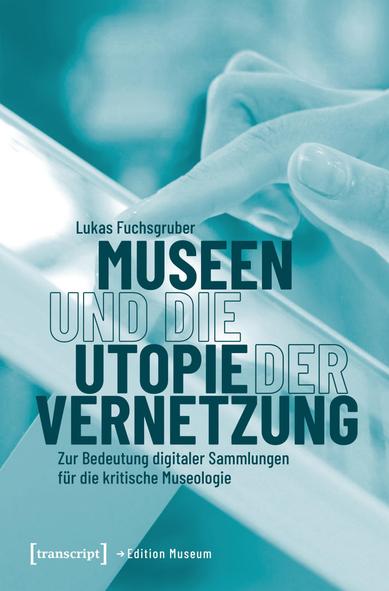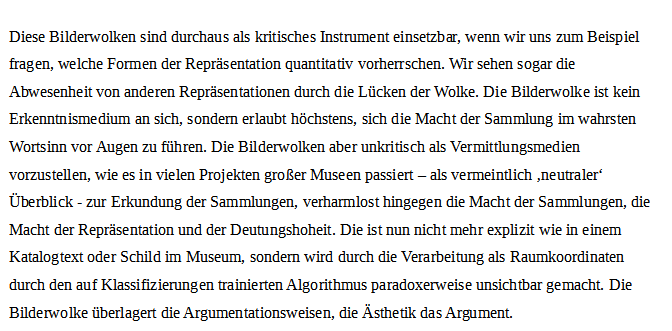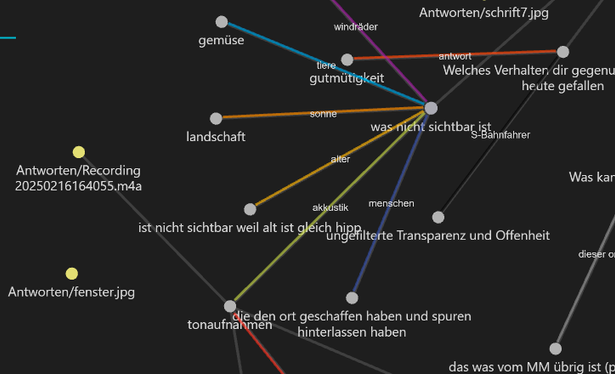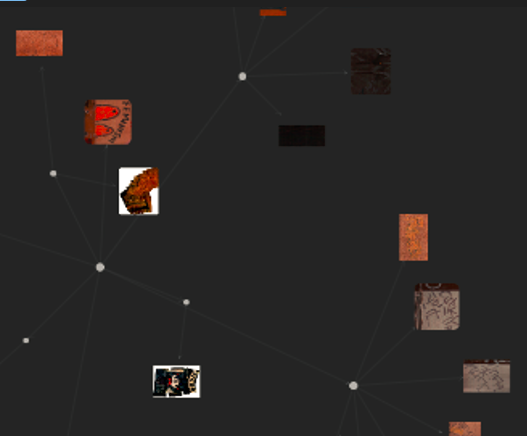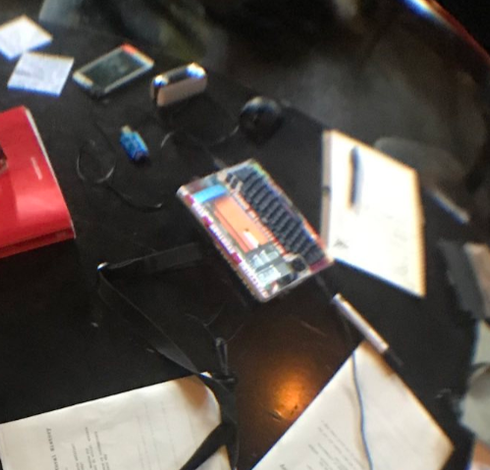Mein Buch "Museen und die Utopie der Vernetzung. Zur Bedeutung digitaler Sammlungen für die kritische Museologie" erscheint im September bei transcript:
https://www.transcript-verlag.de/978-3-8376-7662-4/museen-und-die-utopie-der-vernetzung/?number=978-3-8376-7662-4
Nullmuseum examines the digital worlds around #museums.
Project by @lukasfx in Berlin, my case study was part of Museums and Society - Mapping the Social, a research project of TU Berlin, HU Berlin, Museum of Natural History Berlin, and the Institute of Museum Research of the State Museums Berlin, 2020-2024.
This is a microblog only on my research project.
Mein Buch "Museen und die Utopie der Vernetzung. Zur Bedeutung digitaler Sammlungen für die kritische Museologie" erscheint im September bei transcript:
https://www.transcript-verlag.de/978-3-8376-7662-4/museen-und-die-utopie-der-vernetzung/?number=978-3-8376-7662-4
Bald ist mein Buch fertig...
Kapitel 1 zur Transformation von Museen und zur parallelen Digitalisierung der Museen. Fallstudie SMB-digital 1990-2011
Kap. 2 zu Museen und Plattformkapitalismus
Kap. 3 zu semantischen Netzwerken (z.B. Auseinandersetzung mit Netzwerkvisualisierungen, 🢂Screenshot)
#museum #openglam #glam #dataviz #netzwerkvisualisierung #digitalarthistory #kunstgeschichte
New blogpost about #Obsidian as a digital community archiving tool.
I describe a collaborative way to record information, in an intuitive text format (markdown) and live visualization as a network graph:
My current setup for digital community archiving projects:
open hardware (#raspberrypi) as interfaces. small screens to avoid sitting *behind* laptop screens (pi 400, #adafruit cyberdeck hat, #clockworkpi #devterm).
portable #scanography for creative tracing and mapping.
graph writing in #obsidian, with self-hosted livesync and other plugins (dataview, graph link types, juggl). can be combined with social media webarchiving.
this all is building on prototyping and experimentation in the cooarchi.net art-doc-archive.net #urbandermatology and #opferschicht projects, and recently in the @MuseumfZK
I now released the tabular data of my network analysis (part of my PhD): Experts and Auctioneers in Paris Art Auctions 1852-1862
Description: https://doi.org/10.17613/M60Z96
Chapter in "Das Spektakel der Auktion" (2020): https://books.openedition.org/editionsmsh/23978
Data: https://doi.org/10.14279/depositonce-22602
#artmarket #arthistory #auction #artauctions #19thcentury #19thc #dataviz #networkanalysis
I agree, #tumblr archive is so useful!
I guess you know this, but what I find neat about the tumblr archive is how tags and filtering can be combined there, e.g. put this in the url and it will show only one media type (quotes here) and one tag: /archive/filter-by/quote/tagged/
but when I need to browse for 2 or more hashtags combined, i use tumblr.com/username/search/tag1 tag2 (this has only become available lately). Also I noted that the results differ from username.tumblr.com/search/
And tumblr.com/username/search
I usually try both
I am really curious when tumblr will break these archive and search features, I hope they survive the planned switch to wordpress as the backend (which would bring also activity pub to tumblr, so that‘s exciting…)
Also, there are some search plugins to view posts in obsidian in a similar tiles grid like the tumblr archive, but I never got them to work quite right (especially browsing beyond the first few results I encountered problems)
Werdet Archivar*innen der Gegenwart diesen Sonntag, 16.02. von 14-19 Uhr im Museum für Zeitgenössische Kulturgeschichte @MuseumfZK in der B-Lage in Neukölln.
Es sind keine Vorkenntnisse benötigt, ihr könnt jederzeit dazukommen, da sein, mitmachen oder nicht.
Community-archiving Interfaces werden von uns bereit gestellt. Wir werden gemeinsam den Ort und unsere Perspektiven dokumentieren.
Adresse: Mareschstraße 1, 12055 Berlin
#communityarchiving #archiv #archive #cooArchi #museum #openglam
@thgie thank you, I will have a look at anytype
Obsidian as a community archiving interface:
The plugins Self hosted live sync and Dataview works for synchronized graph writing
(I used IBM Cloudant as sync storage, straightforward to set up, also works on the phone)
#obsidian #obsidianmd #communityarchiving #knowledgegraph #openglam #museum #archive #archives
Since our "cooArchi - community oriented archiving interface" prototype in 2021, I have thought a lot about how to do interactive and collaborative network writing with existing software.
Currently I am experimenting with note taking software. I chose Obsidian, which is not open source, but has many open source plugins. And it writes Markdown files, which can easily be moved and used with other software.
With "Dataviewer" Plugin and "Graph Link Types" Plugin a markdown writing experience similiar to what we tried with the cooArchi interface is possible.
For synchronized/platform writing there is a commercial sync service and I will be exploring self-hosted "LiveSynch" with Object Storage, and "Remotely Save" with Nextcloud WebdAV.
Public test run this Sunday afternoon at the @MuseumfZK in B-Lage in Berlin Neukölln
Werdet Archivar*innen der Gegenwart diesen Sonntag, 16.02. von 14-19 Uhr im Museum für Zeitgenössische Kulturgeschichte @MuseumfZK in der B-Lage in Neukölln.
Es sind keine Vorkenntnisse benötigt, ihr könnt jederzeit dazukommen, da sein, mitmachen oder nicht.
Community-archiving Interfaces werden von uns bereit gestellt. Wir werden gemeinsam den Ort und unsere Perspektiven dokumentieren.
Adresse: Mareschstraße 1, 12055 Berlin
#communityarchiving #archiv #archive #cooArchi #museum #openglam
Das waren leider die letzten, es gibt aber ein PDF hier: https://museumsandsociety.net/de/news/publikationen/publikation-weltbilder-als-heft
Der Vorrat an Heften und Stickern im Fachgebiet Kunstgeschichte der Moderne an der TU Berlin, mit Material zu meinen Projekten mit Studierenden, ist wieder aufgefüllt wenn ihr euch noch was holen wollt.
#museum #museologie #digitalarthistory #digitalekunstgeschichte
Friday is our panel at #ctmfestival / #dancecult25 conference about archiving collectively. We come together around the archives of the closed #menschmeierclub
TU Berlin Room H3002
16:45 New approaches to the documentation of cultural history by Bianca Ludewig @jukeboxutopia, Lukas Fuchsgruber @lukasfx, Mc Mate, Noja Noja and Rrrrr (moderation)
Free entry + live stream available
Abstract:
Archiving collective culture is a social issue. It is about how to relate to each other, how to negotiate shared goals, conflicts and rules.
We consider a variety of approaches, from 3D scans of the remains of parties, to grief counseling when our favorite club closes. Culture is more than facts and data, it is also always about emotions.
Do these different approaches result in an aesthetic of archiving? And how is the collective aspect of it best archived, how can we archive it collectively?
Friday is our panel at #ctmfestival / #dancecult25 conference about archiving collectively. We come together around the archives of the closed #menschmeierclub
TU Berlin Room H3002
16:45 New approaches to the documentation of cultural history by Bianca Ludewig @jukeboxutopia, Lukas Fuchsgruber @lukasfx, Mc Mate, Noja Noja and Rrrrr (moderation)
Free entry + live stream available
Abstract:
Archiving collective culture is a social issue. It is about how to relate to each other, how to negotiate shared goals, conflicts and rules.
We consider a variety of approaches, from 3D scans of the remains of parties, to grief counseling when our favorite club closes. Culture is more than facts and data, it is also always about emotions.
Do these different approaches result in an aesthetic of archiving? And how is the collective aspect of it best archived, how can we archive it collectively?
Vergleiche auch @pluralistic dazu, warum er freeourfeeds unterstützt hat:
"After all, there's no virtue in software freedom. The only thing worth caring about is human freedom. The only reason to value software freedom is if it sets humans free.
If I had my way, all those people enjoying themselves on Bluesky would come and enjoy themselves in the Fediverse. But I'm not a purist. If there's a way to use Bluesky without locking myself to the platform, I will join the party there in a hot second. "
https://pluralistic.net/2025/01/14/contesting-popularity/#everybody-samba
Wie man es noch weiter denken könnte, dazu finde ich Pit Schultz 2018 zum damaligen Facebook Ausstieg spannend: Übernahme und Demokratisierung der Zentralplattformen oder Arbeit an der Nische. Der Text zeigt, wir müssen Technik und Feedpolitik diskutieren: https://non-milleplateaux.de/towards-a-non-facebook/
Ich verstehe, dass viele Bluesky dem Fediverse vorziehen. Zentraler Relay und Suchfunktion ist ein nachvollziehbares Bedürfnis fürs von X konditionierte Publikum, das "globale Dorfplatz" Feeling.
Ich bin neugierig, was für andere Relays es geben wird. 30M soll der erste kosten: freeourfeeds.com
Wenn stattdessen eine solide aufgestellte Stiftung einen non-profit Bluesky Relay in der EU betreiben würde wär das für mich schon ein interessanter X/Twitter-Nachfolger.
Sehr unwahrscheinlich und nicht finanzierbar? Aber sowas bräuchte es dringend.
Governance/Moderation wären dann trotzdem immer noch offene Fragen.
Das Fediverse ist definitiv kein neues Twitter und kein globaler Dorfplatz. Es gibt dort weniger Raum für Populismus und Influencer. Es ist demokratischer und vorsichtiger.
Ich bin eigentlich recht happy, dass sich ein solches alternatives Social Media etabliert hat. Die neuen Ökos…
In my talk ‘Museum criticism for hackers’ at #38C3, I looked at the history of the online collection of the State Museums Berlin, talked about major turning points in digital collections and about a software called GOS developed by the museums in the 20th century.
The talk is an invitation to participate in the critical development, opening and reflection of digital collections, for example by supporting open knowledge networks such as #Wikidata
The talk was in German, but you can listen to the live translation to English and Portuguese. Links to all the versions, on the CCC server and on Youtube:
German:
https://media.ccc.de/v/38c3-glam-zwischen-lod-und----museumskritik-fr-hacker-innen
https://www.youtube.com/watch?v=0XAZLV1DVKM
English:
On the CCC server, same link as above, change language in the player (little settings wheel lower right)
https://www.youtube.com/watch?v=PWYuXeRZ8do
Portuguese:
On the CCC server, same link as above, switch with wheel lower right
https://www.youtube.com/watch?v=2CmYAk26wlo
#museum #openglam #digamus #digitalarthistory #digitalhumanities #museology
